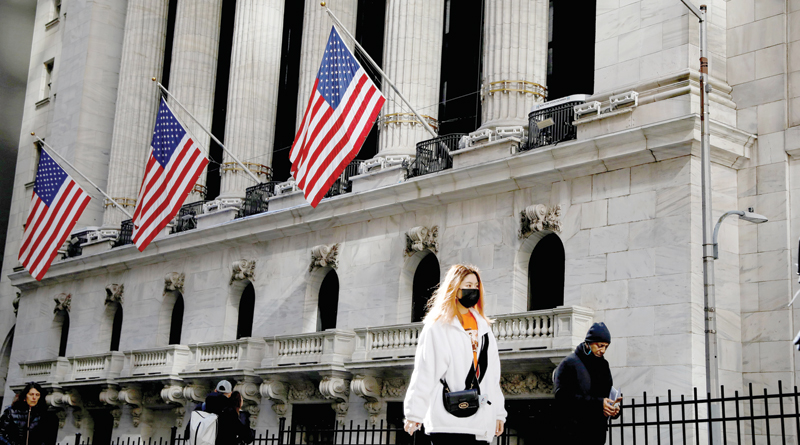

Tommy Wilkes -
The coronavirus panic is jolting stock markets, with steep drops in major indexes grabbing the public’s attention. But behind the scenes, there is less understood and potentially more worrying evidence that stress is building to dangerous levels in crucial arteries of the financial system.
Bankers, companies and individual investors are dashing to stock up on cash and other assets considered safe in a downturn to ride out the chaos. This sudden flight to safety is causing havoc in markets for bonds, currency and loans to a degree that hasn’t been seen since the financial crisis of a dozen years ago.
The key concern now, as in 2008, is liquidity: the ready availability of cash and other easily traded financial instruments — and of buyers and sellers who feel secure enough to do deals.
Investors are having trouble buying and selling US Treasuries, considered the safest of all assets. It’s a highly unusual occurrence for one of the world’s most readily tradable financial instruments. Funding in US dollars, the world’s most traded currency, is getting harder to obtain outside the United States.
The cost of funding for money that companies use to make payrolls and other essential short-term needs is rising for weaker-rated firms in the United States. The premium investors pay to buy insurance on junk bonds is increasing. Banks are charging each other more for overnight loans, and companies are drawing down their lines of credit, in case they dry up later.
Taken together, warn some bankers, regulators and investors, these red flags are starting to paint a troubling picture for markets and the global economy: If banks, companies and consumers panic, they can set off a chain of retrenchment that spirals into a bigger funding crunch — and ultimately a deep recession.
Francesco Papadia, who oversaw the European Central Bank’s market operations during the region’s debt crisis a decade ago, said his biggest fear is that the “illiquidity of markets, generated by extreme uncertainty and panic reaction” could “lead to markets freezing, which is an economic life-threatening event.”
“It does not seem to me we are there already, but we could get there quickly,” Papadia said.
A sign of the times is a hashtag now trending on Twitter: #GFC2 —a reference to the possibility of a second global financial crisis.
The warning signals so far are nowhere near as loud as they were in the 2008-2009 financial crisis, or the 2011-2012 euro zone debt crisis, to be sure. And policymakers are acutely aware of the weaknesses in the financial-market plumbing. In recent days, they have ramped up their response.
Central banks have cut interest rates and pumped trillions of dollars of liquidity into the banking system.
On Sunday, the US Federal Reserve slashed rates back to near zero, restarted bond buying and joined with other central banks to ensure liquidity in dollar lending to help shore up the economy.
“The one thing central banks know how to do following the experience of 2008 is to prevent a funding crisis from happening,” said Ajay Rajadhyaksha, head of macro research at Barclays Plc and member of a committee that advises the US Treasury on debt management and the economy.
While the panic sweeping markets is reminiscent of the 2008 financial crisis, comparisons only go so far. Central bankers have last decade’s shocks fresh in their memories. Another key difference: Banks are in better shape today.
In 2008, banks had far less capital and far less liquidity than they have now, said Rodgin Cohen, senior chairman of Wall Street law firm Sullivan & Cromwell LLP and a top advisor to major US financial firms.
Instead, investors and analysts said, the risk this time comes from the pandemic’s impact on the real economy: shuttered shops, travel bans and sections of the labour force sick or quarantined. The freeze means a severe blow for corporate revenues and earnings and overall economic growth, and for now, there is no end in sight.
Countrywide quarantines to block the virus, such as Italy’s, mean “businesses are going to be hit really hard when it comes to receipts, to revenue,” said Stuart Oakley, who oversees forex trading for clients at Nomura Holdings Inc.
“However, liabilities are still the same: If you own a restaurant and you borrow money for the rent, you’ve still got to make that monthly payment.” JPMorgan Chase & Co economists expect contractions in growth across the globe. And this is as the US response to the coronavirus is only getting started. — Reuters
Oman Observer is now on the WhatsApp channel. Click here



